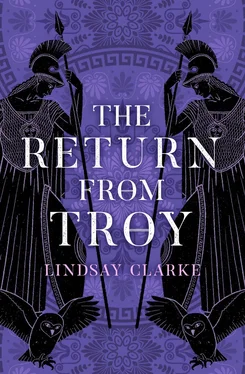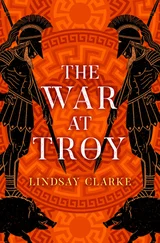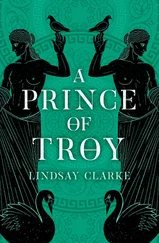‘But how?’ I demanded. ‘I’ve been here all day and I haven’t seen any ships.’
‘You were looking the wrong way,’ Telemachus scowled. ‘Amphinomus put in from Dulichion two hours ago. One of his merchantmen got back from a voyage into the Gulf of Corinth the day before yesterday. He says that more than half the Argive fleet was wrecked in a tempest sailing back from Troy. Hundreds of men were drowned. He says that King Agamemnon has been murdered in Mycenae and the son of Thyestes rules there now. He says that there’s fighting all over Thessaly. A new people with magic weapons have invaded. He says that the whole world has been turned upside down.’
I stood listening to this news dumbfounded. The last we’d heard was that Troy had fallen and the fleet must soon be sailing home in triumph. If the gods had granted us a glorious victory after ten years of war, surely they would spare the host the ravages of a storm? And Agamemnon was the King of Men – how could anyone possibly wrest his throne from him? So when Telemachus began to talk of magical weapons, I became convinced that he was out to make a fool of me.
‘Yes,’ I said, ‘and doubtless the sea will run dry tomorrow and these invaders will walk across the strait and we shall all be struck down by their magic.’
‘It’s true,’ he retorted. ‘It’s all true – not like your stupid songs.’
He turned away and would have left me there on the cliff but I had seen the distress on his face before the anger displaced it. ‘Telemachus, wait,’ I shouted after him. He stopped at my call, a scrawny figure in the fading light with the wind ruffling his hair. ‘Was there any word of your father?’
For a few moments longer he stood in silence; then without turning he said, ‘Nobody knows where he is. Nobody knows whether he’s alive or dead. The fishes might be eating him for all I know.’
King Laertes and all the elders of the island gathered the next day to hear what Amphinomus had to report, and the more we heard the more it seemed that the world had been turned upside down. We learned that the northern reaches of Thessaly and Magnesia had indeed been invaded by a foreign horde armed with weapons stronger than bronze; and that, even though Neoptolemus and his Myrmidons were fighting at his side, King Peleus had been pushed out of Iolcus and was hard-pressed to withstand the Dorian incursions. We learned that Menestheus was no longer king in Athens, having been defeated by Demophon, the son of Theseus, who had now reclaimed his father’s throne. We learned that Agamemnon had indeed been assassinated by his wife and her paramour and that Mycenae was not the only scene of unexpected revolution. Apparently Lord Diomedes had returned to Argos after surviving shipwreck on the Lycian coast only to discover that his wife and her lover had seized the throne of Tiryns; while a similar illicit conspiracy had unseated King Idomeneus in Crete
Being as shrewd as she was wise, Lady Penelope quickly divined the hand of King Nauplius behind this repeated pattern of betrayals. ‘But surely those ill-used lords could combine their powers to help each other,’ she said. ‘Diomedes and Idomeneus are heroes of Troy. Who could stand against them?’
‘They gathered at Corinth with precisely that intention,’ Amphinomus answered. ‘I was there. I heard them planning to join forces and launch a campaign to retake Tiryns first, then to advance against Mycenae, and lastly to mount an expedition into Crete. But the truth is that the war and the storm have left their forces so depleted that they could do none of these things without help; and where were they to turn? Neoptolemus already has his hands full in the north. As yet’ – he cast a rueful glance towards Penelope – ‘they had heard no word of my Lord Odysseus, and Menelaus is rumoured to be far away in Egypt. Of all the warlords, it seems that only old Nestor has returned safely to his throne.’
‘And would he not help them?’ King Laertes asked.
Amphinomus shook his head. ‘He declined their invitation to come to Corinth. He said that, much as he loved his comrades, he was old and weary and still stricken with grief over the death of his son Antilochus in the last days of the war. But he also said what may be true – that it would be unwise to plunge all Argos into a civil conflict which could only leave it weakened against the Dorian threat. Nestor intends to see out his days in peace in sandy Pylos. Should they wish to do so, Diomedes and Idomeneus are welcome to join him at his hearth.’
Yet Amphinomus had not come to the island only to report on events in Argos. It was also his intention to prepare Penelope as best he could for the possibility that her husband might never return. Things he had heard in Corinth left him in no doubt that the Aegean Sea had been hit by a disastrous storm. The coast of Euboea had seen many shipwrecks. Hundreds of men had drowned. As was shown by the case of Diomedes, vessels blown eastwards by the storm had fared little better, and since he had got back, no other survivors had appeared. Amphinomus feared that these unhappy facts offered no good omens for the safe and speedy return of Lord Odysseus.
‘Yet Nestor’s ships all seem to have survived the voyage,’ Penelope countered. ‘And their passage required them to double Cape Malea where the waters can be more treacherous than Euboean kings and faithless wives.’
‘Lord Nestor made an early departure from Troy after the death of his son,’ Amphinomus answered, glancing away. ‘He would have been well across the Aegean before the worst of the storm blew up. He was among the first to return.’
Penelope sat in silence for a time, staring into the hearth where the brands collapsed with a sigh amid a scattering of sparks. For a moment I thought that she too had given up hope; then she shook her head and gave a little smile. ‘But tell me, Amphinomus,’ she said, ‘does the world know of a better seaman than the Lord of Ithaca?’
The young prince of Dulichion shook his finely boned head. ‘There is none, lady,’ he replied, ‘or if there is I never heard tell of him. And yet …’
‘Yet what?’ she defied his frown.
‘I am anxious only that you do not entertain false hopes.’
‘Nor you either,’ Telemachus put in from the shadowy corner where he sat.
The hostile edge to his voice was unmistakable. Mentor and the older men around the table stirred uncomfortably at his petulant breach of hospitality.
‘I try not to do so,’ Amphinomus answered, ‘even though the fate of my kinsman Meges also remains uncertain. I merely seek to be realistic.’
‘As I do myself,’ Penelope intervened, frowning at her son.
‘Yet the fact remains,’ Amphinomus said quietly, ‘that Odysseus was last seen turning back to rescue Sinon and his crew from their sinking ship.’
Penelope smiled. ‘I would expect nothing less of him.’
‘Nor I, my lady, but such care for his friends will have left him far behind the rest of the fleet. He will have been given less time than them to run for shelter. His ship must have taken the brunt of the storm.’
‘Odysseus has run before many storms and lived to tell tales of them. And if I read what you say aright, Amphinomus, then the false beacons that Nauplius lit around Cape Caphareus will have burned themselves out before my husband could be confused by them as others were.’
‘Yes,’ Amphinomus conceded doubtfully, ‘it is certainly possible. Of course I pray, as we all do, that you are right.’
‘Then pray louder and longer,’ Telemachus muttered beside me, ‘and trouble our hearts less.’
But his mother had already raised her indomitable voice. ‘I am quite sure that my husband lives,’ she declared, ‘for I am certain that I would know if he did not.’ Penelope was smiling with the confidence of a woman assured of her own truth. ‘Some difficulty has delayed his return. Shipwreck perhaps … yes, it is possible in so severe a storm; yet even if he has suffered such mischance, he may have survived only to be frustrated by unfavourable winds, or confined by some enemy looking to ransom him. But that Odysseus is alive I have no doubt. My husband has always been among the bravest and most resourceful men in the Argive host. I know that the same courage and ingenuity that took him into Troy when everyone else had begun to believe that city unassailable, will bring him home safely to his wife and son.’
Читать дальше












